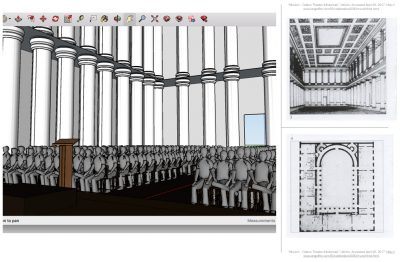Project Showcase: The Semiotics of Sex
14 July 2017 – GVGK Tang

A 3D recreation of the Odeon Theater allows visitors to the Semiotics of Sex website to experience virtually the space where the first queer political protest occurred in 1867. This model reveals a version of the historic site that no longer exists. Image credit: GVGK Tang
The Semiotics of Sex: A History of Queer Identity Politics is a multi-platform digital history project that explores various methodologies for historicizing queer activism and identity for public consumption. Through a commemoration of the 150th anniversary of the world’s first queer political protest, the project demonstrates that digital tools are a vital resource for public historians interpreting queer history.
This story of the world’s first queer political protest comes from my undergraduate thesis, which examined queer activism and nascent community building in late-nineteenth-century Europe and America. On August 29, 1867, Karl Heinrich Ulrichs, a lawyer from Lower Saxony, approached the stage of the Grand Hall of Munich’s Odeon Theater. His purpose was to urge a room full of strangers to repeal discriminatory legislation targeting “deviant” sexuality, the German penal code on so-called carnal violations. The assembly of over five-hundred members of the Association of German Jurists turned their attention to Ulrichs as he approached the speaker’s platform “with breast pounding.”[1] He later recalled: “What gave me the strength . . . was the awareness that at that very moment, the distant gaze of comrades of my nature was fixed on me. Should I return their trust with cowardice?”[2]
The political significance of Ulrichs’ protest–the reason why we may identify it as “the first in the world”–is grounded in his act of sexual meaning-making. Ulrichs forged a sexual identity for the express purpose of organizing people to campaign against an issue that affected them collectively (i.e., anti-sodomy laws). Ulrichs pioneered and politicized queer community building by recognizing a shared interest and attempting to build a platform from it.
Digital tools are very useful when trying to reclaim a seemingly lost history, such as that of Ulrichs’ protest. Early narratives of queer politics have long been neglected by our collective historical imagination. Public history is first and foremost an act of making underrepresented histories readily available and understandable for the layperson. Digital tools are crucial in disseminating and making accessible this “new” information by offering a variety of learning methods that are not restricted to a single physical location. They also empower us to document our own histories and destabilize dominant narratives within our own communities, while accounting for the losses that our histories have suffered. Even in the case of a nineteenth-century “white” European man like Ulrichs (and other queers of his time), censorship and time have both played a role in diminishing the historical record. This project seeks to reconstruct some of it.
For example, the Semiotics of Sex website practices virtual heritage by creating a navigable, three-dimensional model of the Grand Hall of the Odeon Theater, where Ulrichs’ seminal protest took place. The model allows us to humanize the event while engaging in site-specific history. It reveals a version of the Odeon that would otherwise remain inaccessible because the original structure no longer exists. Bombs destroyed the Odeon during World War II, and the auditorium area was later reconstructed as a courtyard for the Bavarian Interior Ministry building.
Re-creating spaces in which history was lived, enacted, and experienced—and exploring such re-creations—helps us attach imperfection, emotion, and memory to historic events (contrary to claiming “objectivities” and reciting “facts”). This project’s particular representation of the Odeon can help us, as public historians, to celebrate Ulrichs’ activism, and to offer an alternative perspective to the narratives absent in our history textbooks. It seems appropriate that this project concluded this June—LGBT Pride Month—a time during which we must do better to reflect on, learn from, and honor our community’s roots.
~ GVGK Tang is a public history M.A. student at Temple University in Philadelphia with a specialization in transnational queer history and politics, nascent community-building, and identity construction.
[1] Hubert Kennedy, Karl Heinrich Ulrichs: Pioneer of the Modern Gay Movement (Concord: Peremptory Publications, 2005), 114.
[2] Karl Heinrich Ulrichs, The Riddle of “Man-Manly” Love. Translated by Michael A. Lombardi-Nash (Buffalo: Prometheus Books, 1994), 262.



